News
Stack Overflow: Old .NET Framework Usage Still Beats 'Most Loved' .NET Core/.NET 5
The big annual Stack Overflow Developer Survey reveals some curious data points, like .NET Core/.NET 5 being the "most loved" non-web dev framework even though the old .NET Framework that it's replacing is still being used more.
The SO survey is one of the largest in the software development ecosystem, with the 2021 edition polling more than 80,000 developers who provided their views on tools and trends. It's noted for its questions about which tools and languages are the most loved, dreaded and wanted. The survey questions that measure "love" and "dread" for various products -- and what products are "wanted" -- are presented like this: "Which other frameworks and libraries have you done extensive development work in over the past year, and which do you want to work in over the next year? (If you both worked with the framework and want to continue to do so, please check both boxes in that row.)" That results in some offerings incongruously ranking highly in all three categories.
For example, .NET Core (now just .NET 5, .NET 6 and so on), was reported to be the "most loved" offering in the non-web framework/library space, reported by 72.67 percent of respondents, even though 27.33 percent said it was "dreaded":
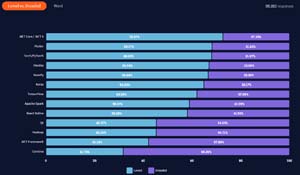 [Click on image for larger view.] Loved Vs. Dreaded Non-Web Frameworks (source: Stack Overflow).
[Click on image for larger view.] Loved Vs. Dreaded Non-Web Frameworks (source: Stack Overflow).
.NET Core was also the most loved non-web framework in the 2019 survey and the 2020 survey:
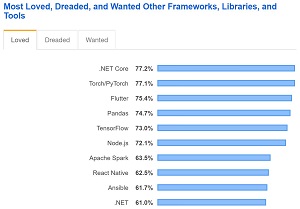 [Click on image for larger view.] Most Loved Frameworks in 2019 Survey (source: Stack Overflow).
[Click on image for larger view.] Most Loved Frameworks in 2019 Survey (source: Stack Overflow).
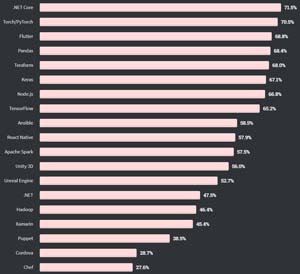 [Click on image for larger view.] Most Loved Other Frameworks, Libraries, and Tools in 2020 Survey (source: Stack Overflow).
[Click on image for larger view.] Most Loved Other Frameworks, Libraries, and Tools in 2020 Survey (source: Stack Overflow).
.NET Core/.NET 5, of course, is Microsoft's open source, cross-platform evolution of the aging, proprietary, Windows-only .NET Framework. While the new approach has been adopted by millions of developers, the SO survey shows .NET Framework topping the list of "other frameworks and libraries" besides web offerings.
In fact, the 19-year-old .NET Framework was used by 34.2 percent of all respondents, while the much newer .NET Core/.NET 5 was listed by 31.5 percent, coming in behind NumPy at 33.84 percent:
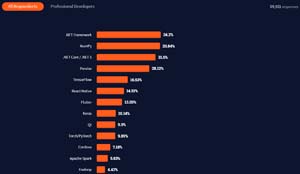 [Click on image for larger view.] Most Used Non-Web Frameworks (source: Stack Overflow).
[Click on image for larger view.] Most Used Non-Web Frameworks (source: Stack Overflow).
Among professional developers, .NET Core/.NET 5 does better, listed by 35.26 percent of respondents, beating NumPy and coming in second to .NET Framework at 37.1 percent:
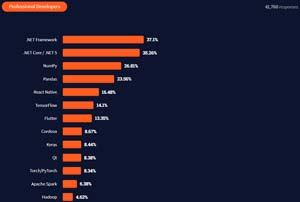 [Click on image for larger view.] Most Used Non-Web Frameworks Among Pro Developers (source: Stack Overflow).
[Click on image for larger view.] Most Used Non-Web Frameworks Among Pro Developers (source: Stack Overflow).
Among web frameworks, Microsoft's ASP.NET Core ranked sixth on the popularity scale, with the old ASP.NET coming in at No. 8:
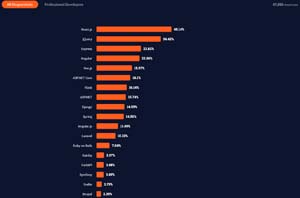 [Click on image for larger view.] Most Used Web Frameworks (source: Stack Overflow).
[Click on image for larger view.] Most Used Web Frameworks (source: Stack Overflow).
However, ASP.NET Core tied with Svelte in the "most loved" question (both were loved by 71.47 percent of respondents and dreaded by 28.53 percent):
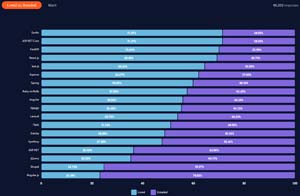 [Click on image for larger view.] Most Loved/Dreaded Web Frameworks (source: Stack Overflow).
[Click on image for larger view.] Most Loved/Dreaded Web Frameworks (source: Stack Overflow).
In the 2020 survey ASP.NET Core was alone as the most loved web dev framework and sixth in the most used:
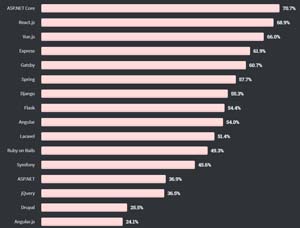 [Click on image for larger view.] Most Loved Web Frameworks in 2020 Survey (source: Stack Overflow).
[Click on image for larger view.] Most Loved Web Frameworks in 2020 Survey (source: Stack Overflow).
In the IDE department, Microsoft rules the roost, with the super-popular, open source-based, cross-platform Visual Studio Code editor extending its years-long lead at No. 1 (71.06 percent). While VS Code is generally classified as a code editor that acts like an IDE through the use of a vast extension library, Microsoft's full-fledged flagship IDE, Visual Studio, was No. 2 at 33.03 percent, ahead of Notepad++ (29.71 percent):
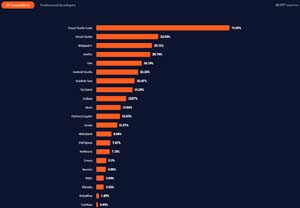 [Click on image for larger view.] Most Used IDEs (source: Stack Overflow).
[Click on image for larger view.] Most Used IDEs (source: Stack Overflow).
That's the exact same ranking found in the 2018 survey.
Several trends persisted from year to year, as perennial leader JavaScript was again the No. 1 programming language and Rust continued its reign as the most loved language:
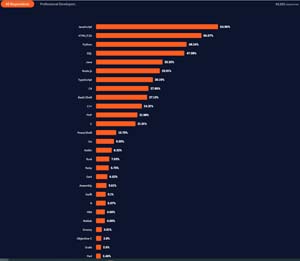 [Click on image for larger view.] Top Programming Languages (source: Stack Overflow).
[Click on image for larger view.] Top Programming Languages (source: Stack Overflow).
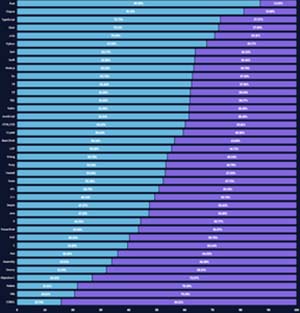 [Click on image for larger view.] Most Loved/Dreaded Programming Languages (source: Stack Overflow).
[Click on image for larger view.] Most Loved/Dreaded Programming Languages (source: Stack Overflow).
On the language popularity ranking, Microsoft's TypeScript was seventh, followed by C#. TypeScript was No. 3 on the most loved question, while F# was 11th and C# was 12th. In the question asking developers what language they would like to work with, TypeScript was second behind Python and ahead of JavaScript.
On the cloud development front, SO for the first time separated cloud platforms from other platforms, finding Amazon Web Services (AWS) holding a big lead (54.22 percent) over Google Cloud Platform (31.05 percent) and Microsoft Azure (30.77 percent).
Other highlights of the report listed by SO in the "technologies" section include:
-
JavaScript completes its ninth year in a row as the most commonly used programming language. For most developers, programming is web programming. Python traded places with SQL to become the third most popular language.
-
This year, React.js surpassed jQuery as the most commonly used web framework.
-
Rust reigns supreme as most loved. Python and Typescript are the languages developers want to work with most if they aren't already doing so. For the sixth year, Rust is the most loved language, while Python is the most wanted language for its fifth year.
-
Windows continues to be the most popular operating system, though slightly less so among professional developers. This year was also the first time we added WSL as an option.Over 90 percent of respondents use Git, suggesting that it is a fundamental tool to being a developer.
-
The most common databases are consistent between all respondents and professional developers. The only difference we observed is that professional developers are slightly more likely to use Microsoft SQL Server over MongoDB. JavaScript completes its ninth year in a row as the most commonly used programming language. For most developers, programming is web programming. Python traded places with SQL to become the third most popular language.
-
Redis is in its fifth year as the most loved database. PostgreSQL barely passes MongoDB with less than a percent as the most wanted database. And IBM DB2 is on its second year in a row as the most dreaded database.
-
While Neovim is the most loved editor it is the 10th most wanted editor.
-
12,590 MySQL developers want to work with PostgreSQL, while 6,429 PostgreSQL developers want to work with MySQL.
-
While AWS is the most loved platform, we see a large influx of AWS developers wanting to develop in Google Cloud next year. 8,586 AWS developers want to work with Google Cloud, while only 7,668 Google Cloud developers want to work in AWS. Developers currently using Heroku or Digital Ocean prefer to start working with or continue working with AWS, then Google Cloud, and lastly Azure. Very few developers currently using Azure want to move to Heroku.
-
Django, Flask, and Spring developers are content to continue working in their respective web dev frameworks. Very few developers want to work with ASP.NET.
-
The developers who want to work in Hadoop are currently using Pandas or Numpy. There and 3,328 Tensorflow developers that want to continue to use you want to use PyTorch, but only 2,328 Pytorch developers that want to move to Tensorflow.
-
We see IPython/Jupyter users want to work in VS Code. This is likely due to VS Codes adding a Notebook API to their IDE.
-
Respondents most often use Google when they get stuck or visit Stack Overflow.
-
Perl moves from being the highest-paid language last year to the fifth highest-paid this year. Clojure developers have the highest median salary, 14k more than second place which belongs to F#.
This year's survey introduced a new insight, measuring technologies developers have Worked With vs. Want to Work With. Thus it includes some interactive visuals showing the languages, databases and frameworks that existing developers want to migrate toward.
And, as with all things, the COVID-19 pandemic affected this year's effort.
"This year's survey was a little different than ones in years past," SO said. "We opened our 2020 survey in February, and by the time we got around to publishing the results, the reality of work and daily life had shifted dramatically for people around the globe. The pandemic continues to exert a strong influence on the shape of our economy and society, so we tried to keep this year's survey shorter and focused on things outside the traditional office."
The extensive survey asks questions about demographics, work (employment, salary, company info) and community, and also explains its methodology.
About the Author
David Ramel is an editor and writer for Converge360.